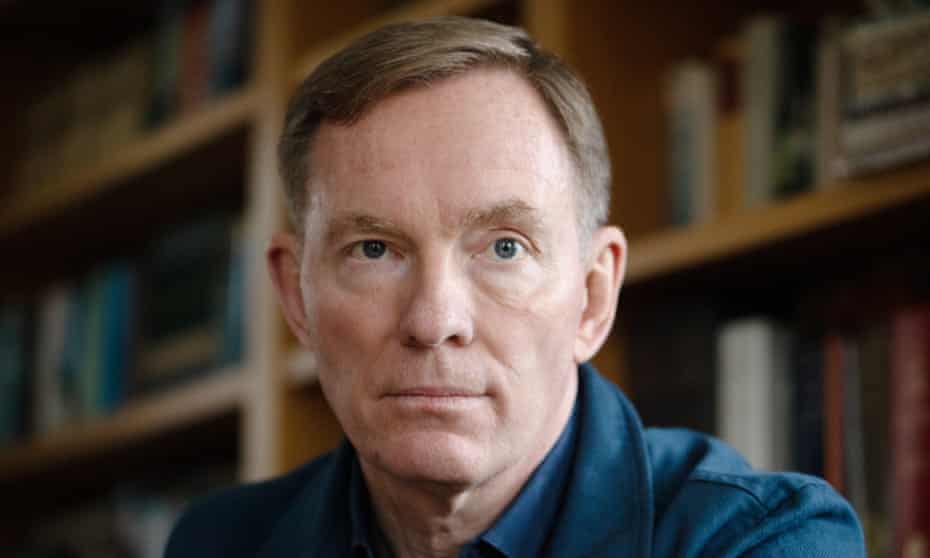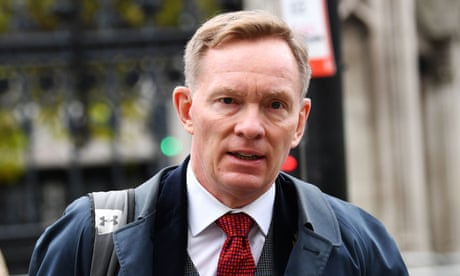Labour MP says No 10 has stirred social divisions and minority groups have suffered as a result

Chris Bryant said Downing Street had learned the trick of focusing on culture wars from Donald Trump. Photograph: Gareth Phillips/The Guardian
Peter Walker Political correspondent
@peterwalker99
Fri 3 Dec 2021
The Labour MP Chris Bryant has said that Downing Street’s focus on culture wars has contributed to an ideological environment in which he feels “less physically safe as a gay man” than was the case 30 years ago.
Bryant, the MP for Rhondda since 2001, whose work as chair of the Commons standards committee has seen him take a leading role in recent discussions about parliamentary sleaze, said he had discussed his worries about fomenting culture wars with “people who work in Downing Street”.
Speaking to Nick Robinson’s Political Thinking, produced by the BBC, Bryant said that while he did not believe Boris Johnson was personally homophobic, attempts to stir social divisions inevitably meant people from minority groups would be targeted.
“They’ve learned this trick in America from Trump and, in the end, culture wars will always pick on those who are slightly different and that means the gays, the Jews and the blacks and that’s always the list that crops up whenever a populist government gets into power,” Bryant argued.
Questioned about examples of culture war policies, Bryant noted the government’s position on transgender people, adding that ministers were also seemingly not prepared to put in place a full ban on conversion practices.
“There’s a world where people think it’s politically advantageous to stir that pot and that makes me genuinely fearful,” he said. ‘I’m not accusing the prime minister of being homophobic but I do feel less physically safe as a gay man than I did 30 years ago.”
While Bryant said he did not spend each day “worrying I’m going to be gay-bashed”, he was concerned about levels of crimes targeting LGBT people, adding that homophobia is “a very strong part of people’s experience of modern Britain”.
Johnson has been regularly accused of seeking political advantage by using divisive cultural issues to woo supporters, and to disparage opponents. Much of the impetus for such policies within No 10 is said to come from Johnson’s adviser, Munira Mirza, and her colleague and husband, Dougie Smith.

Plan to rein in MPs’ second jobs is ‘for the birds’, says Labour MP
As a policy it has manifested in various ways, including regular attacks on “woke” opinions, and attempts to stack cultural institutions and other organisations with ideologically like-minded people.
Mirza was the key organiser behind Downing Street’s official response to racial justice movements in March this year, which played down the impact of structural factors in ethnic disparities and said the UK should be seen as an exemplar of equality.
Such tactics have backfired in the past, such as when Johnson and his ministers had to hastily backtrack from criticisms of the decision of England football players to take the knee before matches amid widespread support for the team during last year’s Euro 2020 tournament.
Peter Walker Political correspondent
@peterwalker99
Fri 3 Dec 2021
The Labour MP Chris Bryant has said that Downing Street’s focus on culture wars has contributed to an ideological environment in which he feels “less physically safe as a gay man” than was the case 30 years ago.
Bryant, the MP for Rhondda since 2001, whose work as chair of the Commons standards committee has seen him take a leading role in recent discussions about parliamentary sleaze, said he had discussed his worries about fomenting culture wars with “people who work in Downing Street”.
Speaking to Nick Robinson’s Political Thinking, produced by the BBC, Bryant said that while he did not believe Boris Johnson was personally homophobic, attempts to stir social divisions inevitably meant people from minority groups would be targeted.
“They’ve learned this trick in America from Trump and, in the end, culture wars will always pick on those who are slightly different and that means the gays, the Jews and the blacks and that’s always the list that crops up whenever a populist government gets into power,” Bryant argued.
Questioned about examples of culture war policies, Bryant noted the government’s position on transgender people, adding that ministers were also seemingly not prepared to put in place a full ban on conversion practices.
“There’s a world where people think it’s politically advantageous to stir that pot and that makes me genuinely fearful,” he said. ‘I’m not accusing the prime minister of being homophobic but I do feel less physically safe as a gay man than I did 30 years ago.”
While Bryant said he did not spend each day “worrying I’m going to be gay-bashed”, he was concerned about levels of crimes targeting LGBT people, adding that homophobia is “a very strong part of people’s experience of modern Britain”.
Johnson has been regularly accused of seeking political advantage by using divisive cultural issues to woo supporters, and to disparage opponents. Much of the impetus for such policies within No 10 is said to come from Johnson’s adviser, Munira Mirza, and her colleague and husband, Dougie Smith.

Plan to rein in MPs’ second jobs is ‘for the birds’, says Labour MP
As a policy it has manifested in various ways, including regular attacks on “woke” opinions, and attempts to stack cultural institutions and other organisations with ideologically like-minded people.
Mirza was the key organiser behind Downing Street’s official response to racial justice movements in March this year, which played down the impact of structural factors in ethnic disparities and said the UK should be seen as an exemplar of equality.
Such tactics have backfired in the past, such as when Johnson and his ministers had to hastily backtrack from criticisms of the decision of England football players to take the knee before matches amid widespread support for the team during last year’s Euro 2020 tournament.
No comments:
Post a Comment